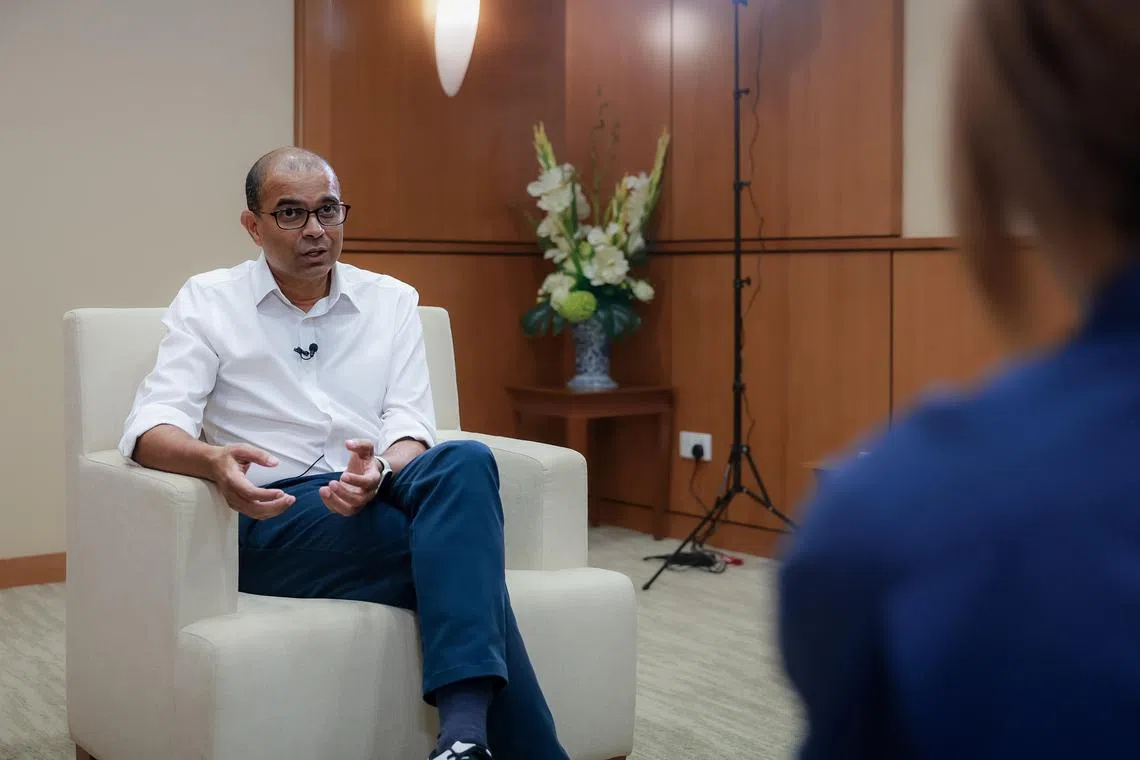No health without mental health
No Wrong Door policy for mental health; anyone who seeks help will get it: Janil Puthucheary
Sign up now: Get ST's newsletters delivered to your inbox

Senior Minister of State for Health Janil Puthucheary said mental health services will become more available in the community.
ST PHOTO: GAVIN FOO
Follow topic:
SINGAPORE – It could be a call or text message to a helpline, a question voiced in confidence to a school counsellor, or an exploratory visit to a polyclinic, but there will be no wrong door in seeking help for mental health challenges, said Senior Minister of State for Health Janil Puthucheary.
As Singapore moves to implement a national mental healthcare strategy
“It shouldn’t matter where (or who) you go to as long as it’s someone you have the comfort with, someone that you have confidence sharing what can be a very difficult issue, someone whom you trust to have advice,” he said.
“For some people, that will be a social worker, someone in a social service agency; it could be a general practitioner, a polyclinic, a counsellor (or) a colleague at work.”
In an exclusive interview with The Straits Times, Dr Janil, who chaired the Interagency Taskforce on Mental Health and Well-being, laid out his vision of a whole-of-Singapore effort to enhance mental health and well-being.
A crucial part of the strategy is a tiered model of care that tailors mental healthcare for individuals according to the severity of their symptoms, and across health, social and education settings.
The four levels of support will range from promotion, self-help and peer support at Tier 1, to the most intensive level of care in hospitals and specialist clinics at Tier 4.
It will mean expanding services in primary care and community settings, strengthening the community, schools and workplaces to be on the alert for people who need help, and shoring up both acute and step-down care.
Though the recent 2023 National Population Health Survey reported an improvement in the mental health of the general population between 2022 and 2023 as the Covid-19 pandemic subsided, younger adults aged 18 to 29 remained more affected than other age groups, with about 26 per cent of them reporting poor mental health.
Findings from the Institute of Mental Health’s (IMH) first nationwide survey
With mental health becoming a growing issue, especially among younger people, the Government is making mental health and well-being a key priority in its national agenda, Prime Minister Lawrence Wong told Parliament on Feb 7.
As mental health issues lie on a spectrum, a broad suite of solutions is needed, he said. It is not just about hiring more psychiatrists or increasing the hospital capacity at IMH.
Dr Janil said mental health services will become more available
Such an approach envisages many touchpoints for those in need, and first responders need not necessarily be healthcare workers.
For instance, volunteers and front-line personnel, including school teachers, and officers from the Singapore Police Force and other agencies, trained in psychological first aid
Said Dr Janil: “We need to make sure that there are ways for people to seek help where they are comfortable... For example, some people have asked for touchpoints and assistance within the education institution, but there are other young people who say I want help nowhere near my education institution.”
This will also be the case with other resources like helplines, he said. While a national mental health helpline and text line
“We do need to coordinate and perhaps bring some of them together. But I think we shouldn’t imagine there should be one single way of seeking help for mental health. There should indeed be multiple channels and multiple routes, but we have to hold a certain standard around quality and access.”
More general practitioners are also boosting their training in mental health
Practitioners will be versed in the No Wrong Door policy.
“We’re not asking the public to please go and know what is Tier 2, Tier 3... We’re not asking the public to please check, before you step in the door, what is the menu of services this provider has. Absolutely not. You go where you’re comfortable. What we want to do is make sure that every provider can then link back to us and across the ecosystem,” Dr Janil said.
Coordinating and making sure that happens will be the work of the new National Mental Health Office, he said.
The tiered model will allow people to get the appropriate level of help, as well as pave the way for mental health to be a part of Healthier SG, where screening can pick up at-risk groups and appropriate care can then be allocated, said IMH chief executive Daniel Fung.
“People now... they say ‘I think I need to see a psychiatrist’ and then they go and see a psychiatrist. But you know the reality is that they may have an issue with where can they best get the help,” said Adjunct Associate Professor Fung.

Using the helpline, for instance, will be like getting a warm handshake, as users can be linked to the right level of care, he said.
Said Dr Janil: “What we’re trying to do is have a sense of the many, many different places you can go to and say, ‘I have some issues with mental health. Can you help me? Can I get some advice? Can you refer me to the next person if (needed)?’
“If there are many, many places for people to seek help, that means we have got our capabilities deployed in a number of areas.”
And he added: “So, whoever you trust, please go and see them.”
Helplines
Mental well-being
Institute of Mental Health’s Mental Health Helpline: 6389-2222 (24 hours)
Samaritans of Singapore: 1-767 (24 hours) / 9151-1767 (24 hours CareText via WhatsApp)
Singapore Association for Mental Health: 1800-283-7019
Silver Ribbon Singapore: 6386-1928
Tinkle Friend: 1800-274-4788
Chat, Centre of Excellence for Youth Mental Health: 6493-6500/1
Women’s Helpline (Aware): 1800-777-5555 (weekdays, 10am to 6pm)
Counselling
Touchline (Counselling): 1800-377-2252
Touch Care Line (for caregivers): 6804-6555
Care Corner Counselling Centre: 6353-1180
Counselling and Care Centre: 6536-6366
We Care Community Services: 3165-8017
Online resources
carey.carecorner.org.sg
(for those aged 13 to 25)limitless.sg/talk
(for those aged 12 to 25)


